Selecting the right grill can significantly elevate your outdoor cooking experience, with each type offering distinct advantages tailored to various cooking styles and preferences. This guide explores the various grill types available today, detailing their features, benefits, and limitations to help you make an informed choice.
Charcoal Grills: Classic Flavor and High Heat
Charcoal grills are favored for their authentic smoky flavor and intense heat, making them ideal for traditional barbecue enthusiasts. Fueled by charcoal briquettes or lump charcoal, these grills offer a distinct taste that’s hard to replicate.
Key Benefits of Charcoal Grills:
- Enhanced Flavor: Charcoal imparts a rich, smoky flavor, particularly cherished in grilling meats.
- High-Temperature Cooking: Achieves extremely high heat, perfect for searing.
- Portable Design: Often compact, making them suitable for outdoor events.
- Cost-Effective: Typically more affordable than other grill types.
Limitations of Charcoal Grills:
- Preheat Time: Charcoal requires 20-40 minutes to reach cooking temperature.
- Maintenance Needs: Cleaning ash can be labor-intensive.
- Temperature Management: Achieving precise temperature control can be challenging.

Gas Grills: Convenient and Efficient
Gas grills are ideal for those who prioritize ease and efficiency. Powered by propane or natural gas, they ignite quickly and offer precise temperature control.
Advantages of Gas Grills:
- Quick Start: Ignites with the push of a button, ready in minutes.
- Temperature Precision: Adjustable knobs allow for fine temperature control.
- Minimal Cleanup: Produces less smoke and ash.
- Versatile Features: Often includes side burners, rotisseries, or griddles.

Drawbacks of Gas Grills:
- Lacks Smoky Flavor: Gas grills don’t naturally provide the same smoky taste as charcoal.
- Higher Cost: Generally more expensive than charcoal models.
- Fuel Requirements: Requires a steady propane supply or gas line, limiting portability.
Electric Grills: Perfect for Indoor and Balcony Use
Electric grills are ideal for apartment living or areas with fire regulations. Powered by electricity, they offer the flexibility of indoor or outdoor use.
Benefits of Electric Grills:
- User-Friendly: Simply plug in to start cooking.
- Versatile Placement: Suitable for indoor and outdoor use.
- Compact Size: Ideal for small spaces, like kitchens or balconies.
Electric Grill Limitations:
- Less Flavor: Lacks the smoky taste of charcoal or gas.
- Lower Heat Output: Doesn’t reach the high temperatures of other grills.
- Reliant on Electricity: Not ideal for locations without a power source.
Pellet Grills: Wood-Fired Taste Meets Technology
Pellet grills combine the rich flavor of wood smoke with modern temperature control. Using wood pellets and digital controllers, they allow for consistent cooking at precise temperatures.
Advantages of Pellet Grills:
- Authentic Smoky Flavor: Wood pellets provide a rich, smoky taste.
- Temperature Control: Digital controls offer precise heat management.
- Multifunctional: Can grill, smoke, or bake, making them highly versatile.
Disadvantages of Pellet Grills:
- Higher Price Tag: Typically more costly than charcoal or gas grills.
- Electrical Dependence: Needs electricity for digital controls and pellet feeding.
- Maintenance Demands: Regular cleaning of the hopper and auger is necessary.
Kamado Grills: Durable and Heat Efficient
Kamado grills, often ceramic, are renowned for their heat retention and versatility. While they use charcoal, their design enables more control over temperature and cooking style.
Key Benefits of Kamado Grills:
- Superior Heat Retention: Ceramic walls ensure even cooking.
- Fuel Efficiency: Uses less charcoal due to excellent insulation.
- Flexible Cooking Styles: Suitable for grilling, smoking, roasting, and baking.
- Built to Last: Made from durable ceramic materials.
Kamado Grill Limitations:
- Premium Cost: Generally more expensive than standard charcoal grills.
- Hefty Design: Heavier construction limits portability.
- Learning Curve: Requires practice to master temperature control.
Portable Grills: Grill on the Go
Portable grills cater to those who enjoy grilling on outdoor adventures. Lightweight and compact, they come in various fuel options, allowing flexibility for travel.
Advantages of Portable Grills:
- Easy Transport: Lightweight and compact for easy travel.
- Fuel Options: Available in charcoal, gas, and electric models.
- Affordable: Typically more budget-friendly than full-sized grills.
Limitations of Portable Grills:
- Limited Cooking Area: Smaller grilling surface is less suited for large gatherings.
- Temperature Variability: Smaller size may limit precise temperature control.
Conclusion: Finding Your Perfect Grill
Choosing the right grill depends on your cooking preferences, lifestyle, and available space. Whether you seek the smoky richness of a charcoal grill, the convenience of a gas grill, or the flexibility of a portable option, understanding each type's features can guide you to the perfect grill for mouth-watering results every time.
